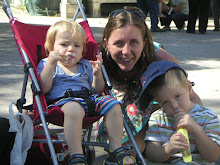A little debate
Interesting conflicting articles in the Guardian today and yesterday (I’m not going to bother with the links, can’t seem to get them right). Yesterday they were discussing some research that says older mothers (40s upwards) experience no more stress or difficulties than younger mothers. In fact, the group that experienced the most stress were mothers in their 30s (I sympathise). Today, they report that older mothers (mid-30s upwards) have a tendency to pass on fertility problems to their daughters, so that these woman may go on to have problems conceiving even in their most fertile years. So, do we support older women who want to have babies later and later as it seems they are perfectly able to cope with motherhood, or does the future wellbeing of that child take precendence, whether that means losing a parent earlier than most people or having a greater likelihood of experiencing fertility problems? The problem with this debate is that so many other issues and preconceptions get dragged in, to do with women’s role in society and ageing and the whole fertility treatment thing, that it becomes increasingly difficult to judge it objectively.
I find myself undecided: I understand the position of a woman who has made her career the focus in her life, or who simply has not met someone with whom she wanted to have children, and then at about 40 decides either that the time is now right – for whatever reason – for her to have children. Who’s to say they’ll be badly off? She may be more emotionally and financially secure than at 20 or 30, she may be a much better mother. But, what about at 50, or 60? What about the teenager whose mother dies of old age, or the sensitive child who is teased throughout school about his old mum, or the young woman who can’t conceive because her mother had her so late? These are surely legitimate concerns, but are they enough to say that it would be better that they had never been born, or that that woman should never experience motherhood? And then there’s also the possibility of adoption. So many children without parents, so many people wanting children. But the process is notoriously difficult and I think older parents are excluded. Why? See above I guess. But is it better to have no parents at all? A whole other debate...
I don’t have an answer, but I certainly think there should be an age limit on fertility treatment, and I think that limit should be around 50, which gives the child 30 years or so with their mother, and also implies a mother young and active enough to deal with a young child. This is yet another issue where the emotional weight lands fair and square on women only, and it seems doubly unfair that many caring, responsible older women get heavily criticised for wanting to have children, when while they were young and fertile they under pressure to pursue their career as competitively as possible, and postpone pregnancy, or risk seeing their male colleagues promoted whilst they stayed put.
I count myself very lucky to have found a way and a place where I can combine motherhood in my early 30s and work I enjoy, but a word of warning – it’s absolutely bloody exhausting!


1 Comments:
My guess us that your links aren't working because you are just puting in www.etc rather than the full http://www. Have another try...
And re superannuated mothers, I (30, no boyfriend, nothing on the horizon) can easily see myself becoming one so I am keeping as open a mind as possible!
Post a Comment
<< Home